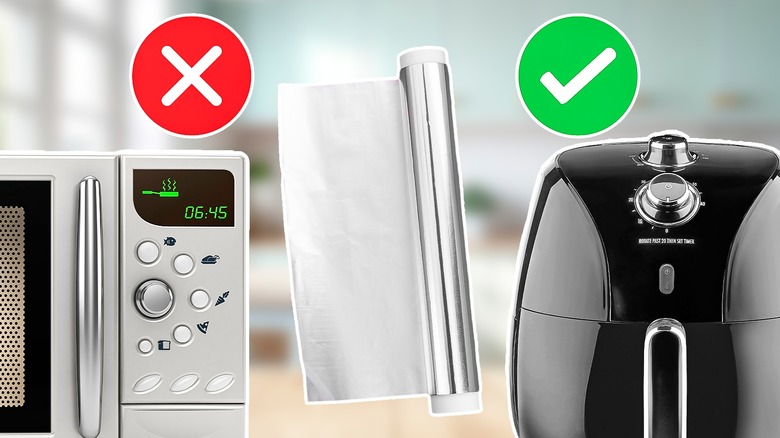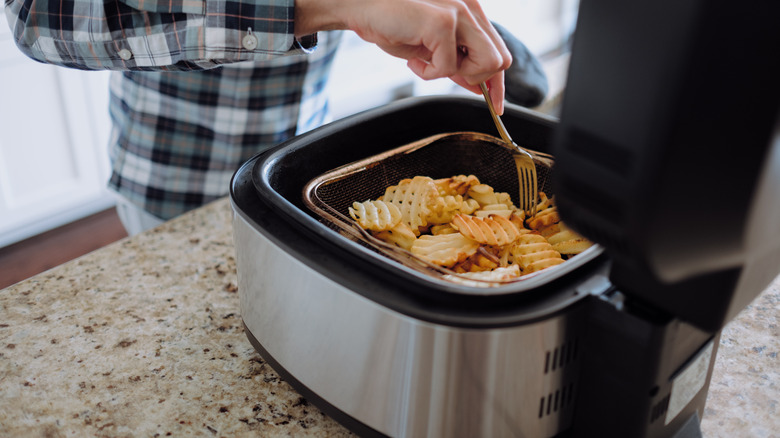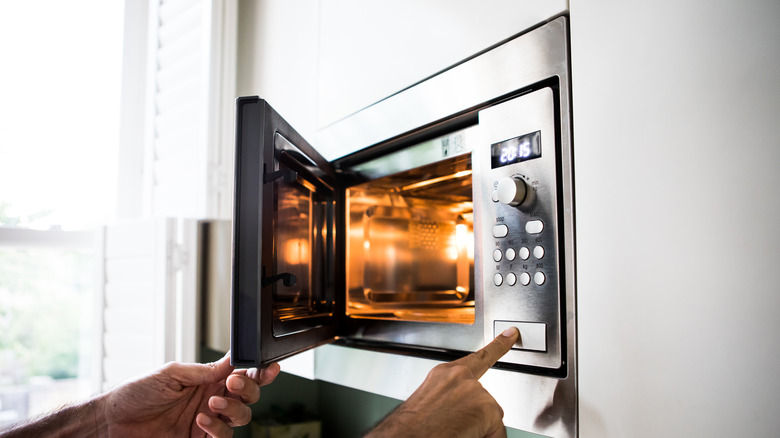Why Tin Foil Is Safe In The Air Fryer, But Not The Microwave
Tin foil is a supremely useful invention: It can protect your lasagna or baked goods in the oven or catch drippy messes to save you from cleaning. But it doesn't play well with all appliances — it's common knowledge that microwaves and aluminum foil don't go well together. However, in an air fryer — which is similarly useful for quickly cooking or reheating food — that same foil is fairly safe to use (with some small caveats). The explanation lies in the way each appliance works: In short, they're two very different technologies.
Let's start with microwaves. Generally speaking, if you switch the microwave on with a fork or some tin foil in there, it'll spark and may catch on fire. Don't try this at home: There are plenty of YouTube videos demonstrating this, if you have to see for yourself. This is due to the electromagnetic waves that a microwave uses to heat food. Those waves penetrate food and heat it, but when they encounter thin metals — like foil or a fork — the waves cause electrons in the metal to accumulate, causing an electric field in that area. This is especially the case with metals that have creases and tips: Bunched up tin foil has a lot of these, so all those pent-up electrons can start to spark, making things dangerous; flatter pieces of metal generally won't have such an intense reaction. Thick metals can handle those waves better, which is why metal microwave walls don't spark when hit by those energy waves.
Air fryers are a wholly different machine
Air fryers are a newer invention than microwaves, in terms of the way they work. Their name is slightly misleading, as these appliances aren't really fryers at all: They actually operate more like a tiny little oven. Specifically, they're similar to convection ovens, which cook food by blowing hot air all around it, although because of the small chamber size on most air fryers, they're a lot faster at it than a full-size oven. The perforated basket in an air fryer means that air can come at your food from all angles, which is why they're so great at crisping up anything from potatoes to green beans. However, that hot air moving around makes them less useful for liquids, which they are more likely to just spray around.
The hot air that an air fryer uses doesn't cause electrons in aluminum foil to move around in the same way as a microwave oven does with its electromagnetic waves. Really, putting aluminum foil in an air fryer is very much like putting aluminum foil in your convection oven. Foil can even be helpful for keeping your air fryer clean, for example, if you're cooking items that might stick to the basket, or breaded things that might shed crumbs. That said, you should check your air fryer manual to see if there are any safety pointers for using foil in it.
Tips for using tin foil in an air fryer (or even a microwave)
There are some gray areas with using foil in these appliances. Firstly, for air fryers, you may want to avoid cooking acidic foods (like tomato or lemon) with foil, as the acid can react with the aluminum and leach it into the food. Secondly, if you put it directly in front of the air fryer's fan or the heating element, you might block the airflow, preventing the appliance from working properly. Finally, bear in mind that if you cover parts of the air fryer — like basket holes — with foil, air flow will be restricted and the food touching the foil may not crisp up as much as without the foil. Generally speaking, while it's safe to use foil in the air fryer, it may not always be the best idea, as it can just get in the way of your cooking.
As for microwaves, it turns out you can microwave smooth metal objects like spoons without much risk of a problem (but not forks). By extension, if you're using nice, smooth foil, it may technically be possible to microwave it without issues, since it's the wrinkles in aluminum foil that cause dangerous sparks. You would also need to keep it away from the edges and ceiling of the microwave for safety. But ultimately, it's probably not a great idea: Even if you can safely microwave foil, metal reflects microwaves, so it'll just impede your cooking or heating. So, it's probably more efficient and safer to just keep the metal out altogether.


